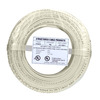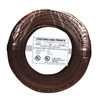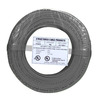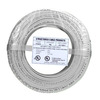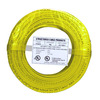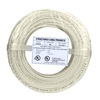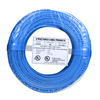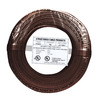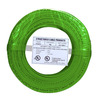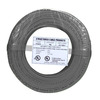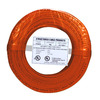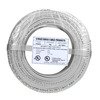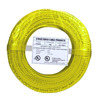Alarm Wire - Bulk
One of the most vital components of an alarm system is the alarm wire. The alarm wire is used to attach all your alarm components together so they work and communicate as a complete system. Depending on how you are wiring your system you will need both 2 and 4 conductor alarm wire for a complete installation. At Cabling Plus we offer the 22/2 and 22/4 alarm wire that the professionals use. Choose the alarm wire you need for a successful alarm system installation!
Use Alarm Wire to install all your alarm system devices!
If you are installing an alarm system at your home or business the bottom line is that you will need alarm wire. A common alarm wire is a simple 22 gauge wire that is easy to work with and easy to install. Depending on the components and devices you are installing, you will need both 2 and 4 conductor alarm wire for a complete alarm installation. This is why you will notice that the most commonly used alarm wire types are offered in 22/2 and 22/4 configurations. In an alarm system installation the 2 conductor or 22/2 alarm wire will be used to wire all your non-powers sensors like window and door contacts. The 4 conductor or 22/4 alarm wire is used to wire all your powered alarm components, like motion detectors and keypads. The motion detectors and keypads use two of the conductors for power, and other two available conductors for the circuit.
Alarm wire is very durable and forgiving which makes it relatively easy to install. An alarm wire will consist of an outer jacket with color coded jacketed conductors inside that are easy to strip and terminate. The color coding of the internal conductors makes it easy to identify the conductors, while ensuring they are wired on each side correctly. You will notice that alarm wire is offered in both stranded and solid copper types. Solid or stranded is basically describing the type of copper wire that is used to construct the internal conductors of the alarm wire. Solid would mean the conductors are made with a single solid wire, while stranded describes the conductors when they are made with numerous small strands of copper. In a stranded alarm wire the numerous wire strands are jacketed together to create the 22 gauge conductor size. Both solid and stranded alarm wire types are just as effective when installing a complete alarm system. Most professional installers who install alarm systems for a living prefer stranded alarm wire because it is more flexible and easier to work with. But stranded alarm wire is usually a little more expensive then the solid alarm wire due to the extra manufacturing costs involved when making it. But at the end of the day both types work just as good, and it really just comes down to personal preference.
At Cabling Plus we offer 22/2 and 22/4 alarm wire in both stranded and solid copper wire types. All of our alarm wire options are CMR, CL2R, and UL rated and certified for in-wall installations in the home or business. So you are guaranteed to have the right alarm wire to do the job. Choose Cabling Plus for all your alarm wire needs!
What is the purpose of alarm wire?
Alarm wire is used to wire all the components and devices of an alarm system. This includes keypads, motion detectors or PIRs, window contacts, door sensors, and any other alarm peripherals you may add to your alarm system. Alarm wire is installed in your walls and ceilings from the component location to the alarm panel. The alarm wire is how you panel communicated with all the devices you have attached to it. The most common alarm wire types are 22 gauge with 2 conductors, and 22 gauge with 4 conductors.
What is the difference between solid and stranded alarm wire?
A solid alarm wire uses just a solid piece of copper to create the 22 gauge conductors that are inside the cable. Where the stranded alarm wire uses multiple strands of copper that are weaved together to create the 22 gauge conductors. The gauge or AWG (American Wire Gauge) describes the thickness of the wire that creates each conductor. So for example, a 22-4 stranded alarm wire will have 4 conductors that are made of 22 gauge copper.
Should I use solid or stranded alarm wire?
Both solid and stranded alarm wire will perform the same. It really comes down to personal preference. The stranded alarm wire is much more flexible than the solid type, which is due to the strand make-up of the wire. Many professional installers prefer the stranded alarm wire because of the flexibility which makes it much easier to pull, route, and install in the walls and ceilings of a home. Stranded wire is more expensive though just because the extra manufacturing steps it takes to build the stranded conductors. So if flexibility is less important than cost to you, then the solid alarm wire may be the best option for you.
What alarm wire should I use to wire motion detectors?
Most motion detectors need a 4 conductor alarm wire ran to them because they need 2 conductors for the circuit and 2 conductors for power. The door and window contacts in an alarm system only need a 2 conductor alarm wire ran to them because they are not powered and are only sending a signal back to the alarm panel.
How do I install alarm wire?
In a common alarm system installation alarm wire is ran from the main panel out to each sensor, detector, siren, strobe light, or any other installed peripheral. Every device is home run wired back to the panel since the panel will be used to manage and control each device.
How much alarm wire do I need for my alarm installation?
It all depends on the size of your system and the number of devices you need to wire for. So do some planning and take your measurements. Often a home owner will wire for devices just so the wire is in place for future add-ons. This is smart thinking because once your walls are closed and painted that last thing you want to do is re-open them. So if you are wiring for future growth or future products it is smart to at least get the wire in while you can.



